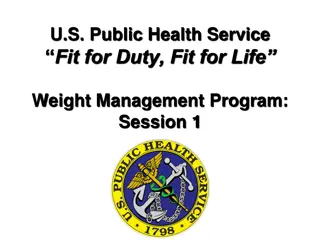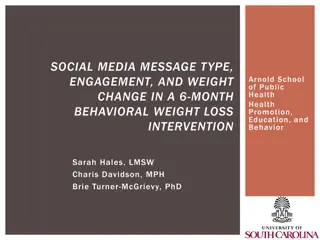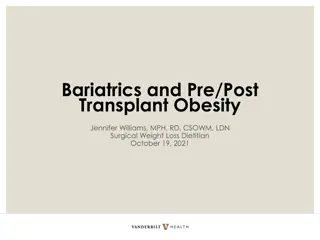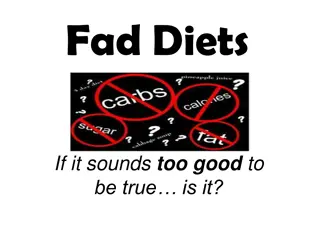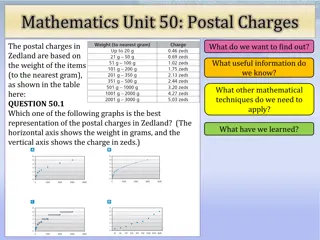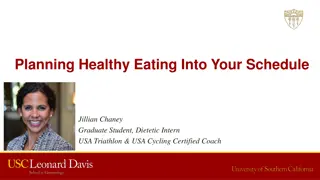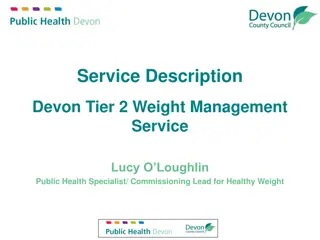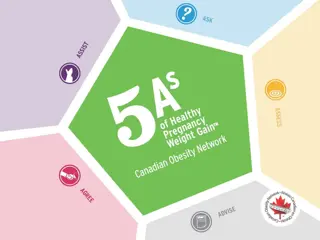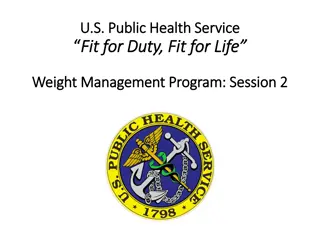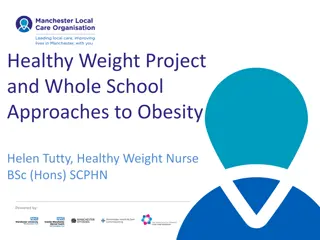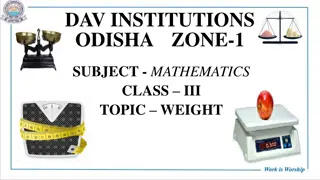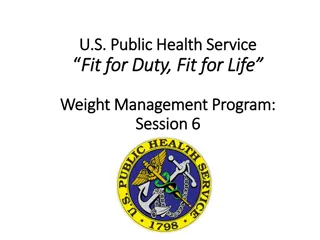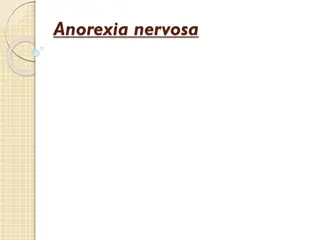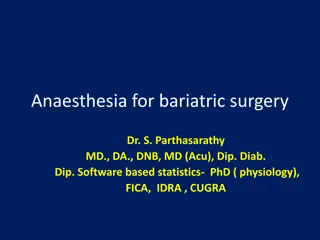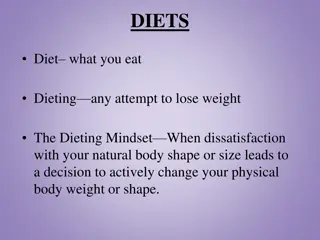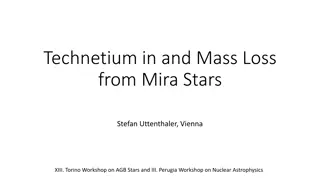Effective Healthy Weight Loss Strategies and Tips
Discover effective and sustainable strategies for healthy weight loss, including the dangers of fad diets, disordered eating behaviors, and the importance of balancing energy intake and physical activity. Learn about the complexities of weight loss, the role of leptin, and the significance of commitment to lifestyle changes. Explore different types of physical activities and the significance of body composition in achieving and maintaining a healthy weight.
Download Presentation

Please find below an Image/Link to download the presentation.
The content on the website is provided AS IS for your information and personal use only. It may not be sold, licensed, or shared on other websites without obtaining consent from the author. Download presentation by click this link. If you encounter any issues during the download, it is possible that the publisher has removed the file from their server.
E N D
Presentation Transcript
Healthy Weight Loss Strategies Kate Gracheck, MA University of Colorado, Colorado Springs
FAD Diets -Sounds too good to be true -Offers a quick fix -Eliminates a food group Danger: -No scientific evidence -Exposes your body to nutrient deficiencies -Set you up to FAIL Low Carb/Atkins Low Fat Diet Pills Single Food Liquid Diets
Disordered Eating Behaviors Restricting Calorie Counting Purging Binging Using food to control emotions
Weight Loss: More than Meets the Eye Feedback Loops Positive: Controls Eating Negative: Inhibits Eating Eating Stops when +/- are Equal Role of Leptin Produced in Fat Cells Acts on brain areas controlling appropriate regulation of food intake, metabolic rate, energy balance, and fat storage Resistance in Overweight Individuals Satiation vs. Satiety Satiation: Process that Ends Eating Satiety: Inhibits Hunger and further Eating with Ingestion Cascade Effect: Psychological/Behavioral Physiological/Metabolic Neurological Fairburn and Brownell (2002). Eating Disorders and Obesity. The Guilford Press: New York.
When the world says, Give up, hope whispers, Try one more time. Anonymous
Healthy Weight Loss Commitment to changing your lifestyle
A Matter of Balancing Energy Calories In Less than Calories Out Calories Out: Basal Metabolic Rate, Daily Activities, Physical Activity or Exercise One Pound=3500 Calories Healthy Weight Loss: -1 pound per week Combination of increasing physical activity, decreasing excess caloric intake, and developing a new relationship with both activity and food
Physical Activity Types Exercise Cardiovascular (Aerobic) Strength Training Other: Dancing, Cleaning, Yard Work, Taking the Stairs, Parking and Walk, Etc Lean Muscle Mass vs. Fat Weight Energy Use Body Composition Set Point Theory Body weight regulation similar to thermostat maintaining room temperature Possible to be overweight but suffer medical complications of being underweight
A Matter of Recognizing Hunger Physical Hunger Gradual/Patient Variety of Foods Stomach Fueled by Physical Need Deliberate Choice/Aware Subsides when Full Realize Eating was Necessary Emotional Hunger Sudden/Urgent Specific Food Above the Neck Mouth and Mind Fueled by Upsetting Emotion Automate/Absent- Minded Does not reflect Hunger or Fullness Result=Feel Guilty
Mindful Eating Be Aware of your Hunger and Fullness Be Mindful: Observe Describe Participate Engage in eating only Be Non-Judgmental Avoid labeling Good or Bad
Healthy Eating Balance Carbohydrates and Protein Eat together for better nutrient absorption Protein: Building Blocks Carbohydrates: Brain Food, Primary Source of Energy Most efficient fuel at rapidly replenishing glucose stores when hungry Balance of high and low Glycemic Index foods also known as complex and simple carbs Be aware of Food Group Caloric Content Protein/Carbs: 4 cal/gram Alcohol: 7 cal/gram Fat: 9 cal/gram Natural Feeding Cycle: Early: Carbs Mid to late: Fat Increase Gradually throughout Cycle: Protein Maintain the Integrity and Purpose of Food: Fuel Source
Healthy Eating Eat every 2-3 hours Keep your metabolism running high Burn more calories throughout the day Eat Breakfast Jumpstart your metabolism Eat a Variety of Foods Balance macronutrients and micronutrients Eat a Colorful Plate Incorporate fruits and vegetables Avoid High-Processed Foods Trans fat, hydrogenated oils, High Fructose Corn Syrup Treat Yourself!
Sustainable Weight Loss Takes Time and Commitment to Change Combination of Behavioral, Physiological, Metabolic, Cellular, and Molecular Functions Naturally Wired to be Energy Efficient and Prone to Storing Moderate Levels of Fat Human bodies have not evolved with the increase in technology over the past 100 years; although, our lifestyles have.
The Grand Canyon was formed over millions of years by one river A great metaphor for determination. Anonymous


